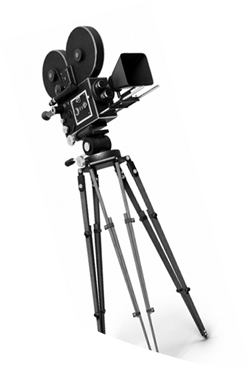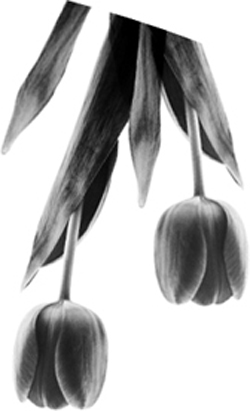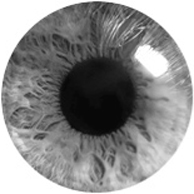Kino (8 page)
Authors: Jürgen Fauth

I had read Bram Stoker's
Dracula
, and I had seen those images beforeâbut not out in the open, outside of my head, projected against a wall for everyone to share. At once fascinating and terrifying, Count Orlok, the death bird, was a wicked apparition with a skull-like, elongated face and pale, wide, haunting eyes. Killing for blood was his nature, and he could not escape it. I loved the ghastly shadows of overgrown nails, the meat-eating plants, the sleepwalking bride, the caskets filled with plague-bearing rats. This was the opposite of father's newsreels, this was the technology of the night, modernity pressed in the service of poetry, culling images from dreams and rendering them visible as if by the light of the moon, for all to see.
It was magic.
To Steffen, it was just one more outrageous night in Berlin, but I went back again and again. I must have seen
Nosferatu
twenty times. “Why do you hurry, my young friend?” an old man asks at the beginning of the film. “No one can escape his destiny.” Like Count Orlok, these magical moving pictures would never let go.
Three years later, I was in charge of my own set in Neubabelsberg, the largest studio in Europe, making a movie that I had written. The producers, the stars, the cameramen and the newspapers all called me Kino, the name I had given myself over Horcher's lamb stew. I was a prodigy, the youngest director in Ufa's history. The lie had become truth.
Herr Dokter: what do you call the power to turn your imagination into reality?

Steffen's reckless exuberance had one drawback: his joy never lasted past morning light, and the comedowns could be terrible. He was prone to melancholy, bitter bouts of disappointment and suspicion, and during those moments, everything he said was critical and cruelâuntil day turned into night and the next thrill came along. Like him, I spent my days cranky and irritable, cursing the sun and wishing it was show time at the Eldorado.
It was on one of those mornings that I took the tram out all the way to the Ufa studios and got myself a job. I liked the girls and the parties, but I was after something else. My father had been a bare-knuckles capitalist, and I had grown up rejecting everything he stood for. Now, all these years later, I can see how much I took after him. I did not judge the world by money, I never calculated human worth by mark or dollar, but his self-reliance and ambition lived in me.
And thus began my illustrious career in the Weimar film industry. I got myself hired as an extra, at the bottom of the ladder. Historical epics were all the rage, and Ufa was desperate for people to fill the frame. It was a miserable job that paid
ein Appel und ein Ei
; day workers doing manual labor on the sets were making twice as much. But I wanted to be close to the camera, so I grinned and followed orders and kept my wild dreams to myself. Rags to riches! I know you Americans gobble this stuff up like chocolate pudding. I walked through two or three Lubitsch pageants, and then every available man was assigned to Fritz Lang's
Die Nibelungen
.

While Ufa geared up for the biggest production in its history, the situation in Germany was deteriorating. In June, a gang of assassins shot the foreign minister on his way to the chancellery, and just to be sure, they lobbed a hand grenade into his car, too. All confidence in the new republic went to hell, and the mark began falling against the dollar. What little money I had left was quickly becoming worthless. Instead of waiting for bankruptcy, I decided to celebrate. I spent everything I had on one raucous night: lobster dinner, dancing,
alles drum und dran
, and when the sun came up, I was sitting in the Lustgarten with Steffen and Ute the Mole Girl, blissed out on opium tea, andâfor the first time in my lifeâbroke. A few hours later, my landlord's daughter, little Susi Oberlin, found me passed out on the
Hinterhaus
staircase. I was still wearing my tux, a shiny
chapeau-claque
, and a white shirt smeared with vomit. I clutched the neck of an almost-empty bottle of champagne.
“
Guten Morgen
,” Susi said, ponytail wagging.
In the early morning light that was falling through the building's stained glass front door, I could see a wet trickle of urine running from my leg onto the linoleum floor. The opium had worn off, and I desperately wanted to be back in my room with the covers over my head. My mouth was dry. I took a swig of champagne. Without thinking, I offered the bottle to the little girl, who sat down next to me and lifted it to her lips, drinking until it was gone. “Nice bubbly for a lowly student,” she said. She let go of a monstrous burp and handed the empty bottle back to me.
My embarrassment gave way to something elseâthe sense that in this city, not even the school children could be counted on to do what they were supposed to. I was broke and wasted, and I wouldn't be able to pay the rent. I'd given my inheritance away but it was just as well; by November, all of it would have been barely enough to afford a turnip, anyway.
Susi said, “You should probably go to bed now,” and I was grateful for her small gesture of kindness. For the first time in my life, I felt that the travails of the time were also mine. I was a true Berliner.
“They call me Kino,” I said, and Susi Oberlin burped again.

The government ordered the newspaper presses to print more money in ever higher denominations. Workers got paid at noon and ran out to spend it before it became worthless. Though I had nothing left, I never went hungryâI was Steffen's friend, and Steffen knew people with dollars, first among them his latest benefactor, Ray, an American art dealer who hosted a never-ending party at the Belvedere, a fantasy castle on the western shore of the Grosse Wannsee looking out across the sailboat-studded bay to the Lido. Ray proclaimed that he'd fallen madly in love with Steffen. Magnus Hirschfeld and some of his students were hanging out naked by the pier, there was dancing on the terrace, and in the west wing, somebody read aloud from a dirty novel they had smuggled in from France, “the most modern book ever written!” There was always enough to eat and drink and snort at the Belvedere.
Demand for drugs was on the rise, and there was more pussy to be had than ever. Can you blame me, Herr Dokter, for helping to move a little bit of both? A few deliveries here and there, the exchange of a package at Zoo station, selecting a few
Tauentziengirls
and boys to join us out at the Belvedere?
Jawoll
, I did my share of drug dealing and whore mongering, but I had dollars, and if you had dollars, you could live like a king. When the French invaded the Ruhr, prices went up further, but the parties at the Belvedere never slowed down: there was an insane edge to everything, absurd desperation in the air. When winter came, the Oberlins, my landlords, began heating the building with buckets of last week's money like everybody else. Germany's undernourished children died of tuberculosis and war veterans dragged themselves through the streets begging for a bite of stale bread or a ladle of cabbage soup. You could have an entire
Kneipe
dancing naked for a few coins but a billion marks bought you a cigarette. People were sniping from the rooftops out of hunger and desperation. Misery stared us in the face but we danced at the Kleist Casino.
In my sheltered, privileged life in Königstein, we had profited from pain. My new family just happened to survive very well.

In Neubabelsberg, the studio was stockpiling food for the cast and crew. Inside the Grosse Halle, there was only one law, one rule, one thing that had to be done: whatever Fritz Lang wanted.
Fritz Lang. Even before I ever met the miserable son of a bitch, with his monocle and superior airs, I hated him. Hot off
Dr. Mabuse
, Lang had been all over the papers with his marriage to his screenwriter bride, Thea von Harbou. In bad times, a little bit of celebrity goes a long way, and the public was eating up every idiotic rumor about the master and his muse. I had heard things, too: that the suicide of Lang's first wife had been anything but, that he couldn't climax unless he had the taste of blood on his tongue. On set, Fritz and Thea were aloof and unapproachable, like King Gunther and his Queen in the German legend we were filming, a turgid saga without hope or love.
I detested Lang's histrionic style, the ghastly overacting and oppressive angles. In person, he was an insufferable asshole. He bellowed orders and treated people like puppets. He made his actors repeat scenes for twenty, thirty, fifty takes and directed by assigning numbers to gestures and facial expressions. Then he'd count them off while the camera rolled: one, two, turn your head, smile, six, seven, faint, nine, ten. He had nothing but disdain for actors; he was a bully and a bore. And yet I watched him closely, learning as much as I could.
On the day Lang shot Siegfried's arrival in Worms, I was coming down from a three-day bender, having trouble standing up straight in the knight's heavy chain mail and helmet. Holding the shield before me, I stood shaking where Lang had placed us on a tiled floor, lined up symmetrically. By the time we redid the scene for the twentieth time, I was itchy in the ill-fitting costume. I had loosened the strap that held my leg in place. Just when Kriemhild was descending the staircase again, I could feel my leg slip until, with a slight thud, it fell flat on the ground before me.
“Cut!” Lang barked through his bullhorn, his monocle dropping out of his eye. I had ruined the take. “We are hiring cripples now? All I needed was somebody to
stand
there, and you get me a guy who's missing a leg? The warriors of Worms don't suffer from runaway limbs!”
Out of the darkness behind him, Thea von Harbou appeared, cradling her lap dog like a baby. She was always on set, wearing the same green outfit every day. She knitted sweaters and dictated novels to an assistant.
“Fritz,” she said, putting a calming hand on his arm. I had witnessed this before, Thea smoothing over Lang's rough edges, calming his fearsome tantrums for the sake of the production. “Everyone's good for something.”
With my leg in my hand, I went blank. She was buying me time, giving me an opportunity to speak up for myself, but I didn't know what to say. What
was
I good for? The only job I wanted was Lang's, but if I'd told him that, he would have pulled out his Browning and shot me on the spot. My career would have been over before it startedâif Gerhard Gruber, the set designer, hadn't explained that he was having trouble setting up Siegfried's epic battle with the dragon. Gruber had constructed a huge beast, a monster of twenty-five meters that was operated from the inside, but the man who worked the tail complained there wasn't enough room for his legs.